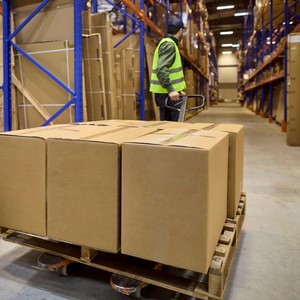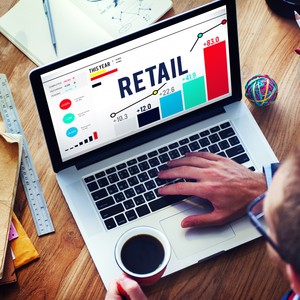Complete Guide to Retail Software
In the fast-paced and competitive world of modern retail, success often hinges on operational efficiency, understanding customer behaviour, and making smart, data-driven decisions. And thanks to the latest developments in retail software solutions, this isn’t something you need to tackle alone.
Retail management software acts as the central nervous system for today’s retailer, providing all the essential tools to connect your sales channels, streamline operations, and enhance the customer experience in an increasingly omni-channel world. In this guide, we’ll explore exactly what retail software is, how it works, and the benefits it provides. We’ll also take a closer look at some of the powerful, end-to-end solutions Futura offers to help your business thrive.

What is Retail Software?
Retail software is a specialised suite of applications designed to manage every aspect of a retail business. It integrates various functions into a single, cohesive system, providing an end-to-end platform for all your operational needs.
At its core, retail software helps businesses handle key processes including, but not limited to:
- Point of Sale (POS) transactions
- Inventory and stock control across all channels
- Customer relationship management (CRM)
- Purchasing, buying, and supplier management
- Sales reporting and data analytics
- Merchandise planning
- Warehouse Management
- E-commerce integration
By connecting these different functions, retail software can eliminate data silos, automate manual tasks, and give you a real-time, 360-degree view of your entire retail enterprise.
Types of Retail Software
Retail software solutions can be broken down into several types, each focusing on a specific area of operations:
- Point of Sale (POS) System: The front-end software used at the till to process transactions, manage returns, and capture customer data.
- Inventory Management System: Dedicated to tracking products from receiving to sale. It monitors stock levels, manages inter-branch transfers, and facilitates stock-taking.
- Customer Relationship Management (CRM): Focuses on managing interactions with customers, storing data, tracking purchase history, and managing loyalty schemes.
- Merchandising Software: Helps retailers plan which products to sell, at what price, and in what quantities, using tools like Markdown Planning and In-Season Price Management. These features allow you to react to real-time sales trends by adjusting pricing and promotions mid-season—maximising sell-through, reducing overstock, and protecting margins.
- Supply Chain Management (SCM) Software: Manages the flow of goods from supplier to warehouse to store, including purchasing and order management.
- Warehouse Management System (WMS): Controls all warehouse operations, including goods-in processing, multi-location stock tracking, and the picking, packing, and dispatch of orders for both store replenishment and online customers.
- Retail Management System: The most comprehensive software solution, a retail management system unifies all core aspects of a retail business. By integrating functions like point-of-sale, inventory management, customer relations, and e-commerce into a single platform, systems such as Futura’s Enterprise Retail System provide a centralised view of your retail operations.
Retail Software Benefits
Implementing a comprehensive retail management system offers a multitude of benefits that translate directly to improved efficiency and profitability:
- Increased Efficiency: Automate time-consuming tasks like stock counting, purchase order generation, and daily sales reporting. This frees up your staff to focus on more value-added activities, such as customer service and sales.
- Optimised Inventory: Gain real-time, centralised visibility of your stock levels across all stores and your website. This helps prevent overstocking and stockouts, reducing carrying costs and lost sales opportunities.
- Data-Driven Decision Making: Move from guesswork to strategy. With centralised data and powerful analytics, you can easily identify best-selling products, understand seasonal trends, and make informed decisions about purchasing and merchandising.
- Enhanced Omni-Channel Customer Experience: With a unified system, you can build detailed customer profiles, track purchase history across all touchpoints, and implement effective loyalty programs and gift cards that work seamlessly online and in-store.
- Greater Accuracy: Manual data entry is unavoidably prone to error. Retail software automates data capture at the point of sale and throughout the supply chain, ensuring the accuracy of your sales, stock, and financial information.
- Scalability for Growth: As your business grows, whether by adding new stores, franchises, or launching an e-commerce site, a robust retail software solution can scale with you, providing a stable foundation for expansion.
How does Retail Software Work?
Retail software operates on the principle of a central database that acts as a single source for the entire business, connecting all your channels. Here’s a simplified breakdown:
- Data Input: Information is captured at various touchpoints. A sale is processed through the in-store POS terminal, an online order is placed on the e-commerce site, or new goods are received in the warehouse.
- Central Processing: All this data is fed in real-time into the central database. The software immediately processes the information. When an item is sold in-store, the system automatically deducts it from the inventory count available to the website.
- Real-Time Updates: The updated information is instantly accessible across the entire system. A manager at the head office can see live sales from all stores. The e-commerce site shows the updated stock level, preventing the sale of an out-of-stock item and creating a more reliable and better-flowing customer experience.
- Analysis and Reporting: The software continuously aggregates data, allowing management to pull up-to-the-minute reports on sales performance, stock turnover, and customer behaviour. This feedback loop informs everything from daily operations to long-term strategy.
Key Features of a Modern Retail Management System
When evaluating retail software, it’s crucial to look beyond the basics. A truly effective Retail Management System (RMS) must integrate multiple functions into one cohesive platform, helping to drive efficiency and growth. Here are the key features to look out for in a comprehensive solution.
Centralised Stock Control
A core feature of any powerful RMS is its ability to provide a single, real-time view of inventory across all locations, from the warehouse to multiple shop floors and online channels. This is crucial to avoid unwanted events like stock-outs and overstocking.
Look for systems that empower better forecasting and buying decisions. Additionally, the ability to use handheld scanners for goods-in, cycle counts, and inter-branch transfers is crucial for streamlining processes and achieving granular, error-free stock control.
Unified Item & Product Management
Effective item management is at the heart of any successful omni-channel strategy, and accuracy and consistency are nothing short of vital for your product catalogue. A strong system should provide a “single source of truth” for all item data. This means you should be able to input product information – including descriptions, pricing, promotions, and variations like size and colour – in one central location. That data should then sync automatically, and in real-time, across your entire retail ecosystem, ensuring a fluid and reliable experience for both staff and customers.
Intelligent Purchasing & Buying Tools
Modern retail systems move beyond manual purchase orders. To make confident decisions, your buying team needs access to real-time sales performance data and live stock levels.
The best platforms offer flexible tools, ranging from simple PO creation to intelligent, demand-driven re-ordering based on sales velocity and target stock levels. Features like support for multiple Open to Buy (OTB) calculations are signs of a sophisticated system that delivers an efficient buying process.
Comprehensive Reporting & Business Intelligence
Raw data is only useful if it can be transformed into actionable insights. Therefore, another key feature to look for is a dynamic reporting & analytics suite. This should include a range of “out-of-the-box” standard reports for immediate insights into daily operations.
For deeper analysis, advanced Business Intelligence (BI) tools are also essential. These allow you to create custom visualisations and in-depth reports to track the specific KPIs that matter most to your brand, providing the foundation for data-driven analysis.
Strategic Merchandise Planning
To maximise every sales opportunity, you need your stock to be in the right place at the right time. This is where intelligent merchandise planning is essential. A robust system will include tools to optimise inventory levels, improve sales forecasting, and ensure stock is allocated efficiently across all channels. By leveraging advanced budgeting, forecasting, and replenishment features, businesses can gain superior financial control, reduce excess stock, and maximise sales.
Integrated Warehouse Management System (WMS)
For retailers managing their own stock in a warehouse, an integrated warehouse management solution, or WMS, is non-negotiable. This functionality handles the complexities of warehouse logistics, improving order picking speed, accuracy, and overall operational visibility.
User-friendly platforms designed for scalability, such as our StockHub WMS modules, support growing retailers in expanding their business, handling increasing demand without friction.
Unified Customer Relationship Management (CRM)
In today’s market, understanding the wants and needs of your customers across all channels is paramount. A powerful, integrated CRM will capture and centralise customer data from every touchpoint, be it in-store transactions, online purchases, and loyalty sign-ups, into one single profile. This unified view allows you to consistently recognise shoppers and deliver personalised offers and tailored experiences to build customer relationships that last.
Electronic Data Interchange (EDI)
To help improve your supply chain efficiency, look out for EDI capabilities. This feature automates communication with your suppliers, eliminating time-consuming manual data entry for purchase orders, invoices, and dispatch notes. In turn, this ensures unmatched accuracy and speed.
Advanced EDI integrations can even automatically create a supplier’s entire product catalogue within your system, saving countless hours and reducing costly errors.
A Truly Integrated, All-in-One System
Finally, and perhaps most crucially, it’s important to pick a system that integrates all of the above components into a single, unified platform, avoiding data silos between departments. When your EPOS, stock, CRM, and merchandising solutions all share the same data source, you can achieve true end-to-end visibility. This cohesive approach, which you can find in our dedicated retail management system, the Futura Enterprise Retail System, is the gold standard for any effective retail management software solution, helping you to drive efficiency and make data-informed decisions across your entire business.
Investing in Your Retail Future
In the modern retail landscape, operating without a powerful, integrated software solution means leaving efficiency, insight, and profit on the table. The right retail management software is a strategic asset that will help you control your inventory, understand your customers, and make smarter decisions that fuel growth.
Are you ready to take control of your retail operations and unlock your business’s full potential?
Contact the Futura team today to schedule a free, no-obligation demo and discover how our solutions can be tailored to your unique needs.
Retail Software: FAQs
What is the difference between POS software and full retail management systems?
A Point of Sale (POS) system is primarily focused on processing customer transactions. A full retail management system, like Futura’s, is an end-to-end solution that integrates the POSEPOS with all your core retail functions – including inventory, CRM, buying, warehouse, and reporting – to create a single, unified platform for your entire business.
Is retail software only suitable for large, multi-store chains?
Not at all. While essential for large chains, it offers tremendous benefits for small and medium-sized businesses (SMBs) too. By automating processes and providing key insights, it helps smaller retailers operate efficiently and build a strong foundation for growth.
How much does retail software for retailers cost?
The cost varies depending on the scale of your business and the modules you require. It’s best to view it as an investment that delivers a significant ROI through increased sales, reduced stock holding, and improved efficiency. Contact us for your personalised quote.
Can your software integrate with my existing e-commerce website?
Seamless integration is a core strength of the Futura system. We ensure that your e-commerce platform connects directly to the central database, providing a single real-time view of stock, sales data, and customer information. This creates a unified experience across every touchpoint, whether a customer shops online, in-store, or via click-and-collect.
How long does it take to implement a new retail software system?
The timeline can vary, but a typical project involves discovery, system configuration, data migration, training, and go-live. Our experienced project management team works with you to create a clear timeline and ensure a smooth transition with minimal disruption.
What kind of training and support do you offer after installation?
We view our relationship as a long-term partnership. Futura provides comprehensive training for your team. After you go live, our dedicated UK-based helpdesk team is available to provide ongoing support and advice to help you get the most out of your investment.


